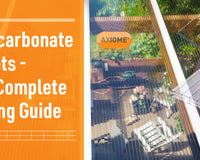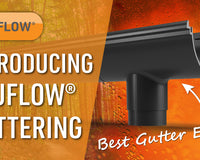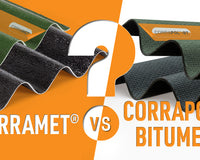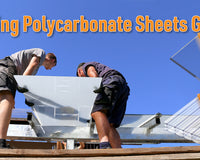Whether you are building a conservatory, creating a lean to roof or roofing your garden pergola, polycarbonate sheeting will likely be one of the top roofing options you will consider. As a lightweight and stronger alternative to glass, polycarbonate is a cost-effective glazing solution that is easy to install whilst creating a stunning finish.
Buying polycarbonate sheeting online or in-store can be overwhelming so in this buying guide we are going to cover everything you need to know when purchasing polycarbonate roof sheets for your project. We are going to cover common questions about choosing polycarbonate for your project, comparing alternatives, installing polycarbonate and more!
Click on the sections below to skip down to the section you are interested in:
- Polycarbonate Sheet Overview
- Polycarbonate Sheet Pros & Cons
- Choosing Polycarbonate Sheet
- Buying Polycarbonate Sheet
Polycarbonate Sheeting Overview
What is polycarbonate sheet?
Polycarbonate Sheeting is popular compared to other lower grades of plastic sheets, such as Pet G and Acrylic, due to its durability and installer-friendly properties. Polycarbonate is a thermoplastic sheet that was first discovered in the mid-1900s but only really came into more mainstream use in the early 1970s when more modern technologies allowed it to be manufactured with crystal clear clarity! Prior to this polycarbonate was made with a brown tint, or cognac coloured as they called it.
Fast forward to today and polycarbonate sheeting is one of the most popular plastic sheets manufactured and used in millions of applications globally every year.
Where can polycarbonate be used?
Due to Polycarbonate’s unique mix of qualities, it is one of the most versatile materials you will find. It can be used in a wide range of applications both at home and commercially, from canopy glazing to carports to cloches! Since the spread of Covid, people will have been used to seeing it being used as cough screens and protection barriers in shops, offices and public areas more regularly, however, polycarbonates most common use is a roofing sheet. Popular places where polycarbonates sheet is used include:
- Lean tos
- Canopies
- Pergolas
- Porch Roofs
- Greenhouses
- Carports
- Verandas
- Cold frames
- Potting sheds
- Orangeries
- Shelters
Polycarbonate sheeting also is used on many other glazing projects such as stadium dugouts, screening, car wash bay screens and a host of more unique uses! This is why it is unbeatable as a glazing sheet option.
What types of polycarbonate sheeting are there?
Broadly speaking there are two main types of polycarbonate sheets which are solid polycarbonate and multiwall polycarbonate. When considering multiwall polycarbonate, it is often split into Twinwall polycarbonate sheets and multiwall polycarbonate sheeting, however, in essence, these are the same, just different quantities of internal walls!
Both types of polycarbonate sheeting as equally as durable and easy to install meaning the choice between them is more about looks, budget and strength.
What is Solid Polycarbonate?
In a nutshell, solid polycarbonate is a plastic sheet that looks like glass but is a stronger and lighter alternative. At up to 200x stronger than standard glass of the same thickness, solid polycarbonate has the ‘glass look’ but is virtually unbreakable and only weighs half as much as glass.
Solid Polycarbonate sheets come in a range of thicknesses from 2 to 12mm with the 6mm thickness tending to be the most popular and widely used. To suit different applications, solid polycarbonate is manufactured in a range of tints including clear, bronze, opal, black and patterned.
What is Multiwall polycarbonate sheeting?
Multiwall polycarbonate sheets are manufactured from various layers which create a honeycomb type structure. Ever popular, multiwall sheeting is the most common type of polycarbonate sheeting due to its affordable cost and superior thermal insulation. Much like Solid Polycarbonate sheets, multiwall polycarbonate comes in a range of tints including clear, bronze and opal. The most popular thickness of multiwall polycarbonate is 16mm, however, we also manufacture multiwall bigger thicknesses of 25mm and 35mm.
What is Twinwall Polycarbonate?
Twinwall polycarbonate is identical to multiwall polycarbonate but just has two layers rather than multiple layers – as the name suggests! Twinwall polycarbonate is available in a range of three thicknesses including 4mm, 6mm and 10mm giving different strength options for different types of roofs.
Primarily used for smaller projects, the Twinwall polycarbonate comes in clear mainly but also opal and bronze in the 10mm thickness. It is worth noting that 4mm and 6mm polycarbonate sheets are not recommended for roofing projects but rather as cost-effective plastic sheeting for smaller garden applications like cloches and cold frames.
Polycarbonate Sheeting Pros & Cons
Benefits of Polycarbonate Sheeting
Both solid and multiwall polycarbonate roofing sheets provide a wide range of benefits for installers making them an excellent choice for a variety of roof projects.
- Virtually unbreakable
- Lightweight
- Easy to cut and drill
- Long-lasting clarity - UV Protected
- Insulating
- Fire-resistant
- Sustainable
Virtually unbreakable: A key benefit of polycarbonate sheets is their robustness and impact resistance which means they are virtually unbreakable! Be aware most plastics are not like this as, unlike acrylics and other plastic sheeting, polycarbonate can be hit with a base bat or football and survive! Homeowners can comfortably install polycarbonate, more so solid sheets, without worrying about the fragility to hail or a stray football coming from the garden!
Lightweight: Ease of installation is a key consideration when you are choosing a roofing sheet to use and a big part of that is weight. Heavy options like glass can cause handling challenges, especially when high up on a roof. Solid polycarbonate is around half the weight of glass of the same thickness and multiwall polycarbonate around is 1/10 the weight of glass of the same thickness! For example,
| Glazing Type | 6mm Glass | Axgard 6mm Solid Polycarbonate | Axiome 25mm Multiwall Polycarbonate |
| Approx. Weight Per Square Metre | 15 kg | 7.2 kg | 3 kg |
Easy to cut and drill: Another area polycarbonate shines in is how easy it is to cut and drill. Polycarbonate is undoubtedly the easiest plastic sheet to cut and drill. No need for installers to worry if a sheet is needing to be trimmed down as it can be down easily and neatly. Read on to find out how to cut polycarbonate and how to drill polycarbonate in later sections. Clear Amber Shop can also cut to size for you if you are still unsure.
Long-lasting clarity: UV Protected: Proper UV protection is important on clear roofing sheets to ensure long lasting clarity and light transmission. All our polycarbonate sheets, Twinwall, multiwall and solid, are UV protected on one or two sides to give a great roof lifespan! UV protected sheets are not to be confused with UV stable or UV resistant which are seen on some sheets (like PVC) and aren’t as effective. You may well have noticed cracked and mouldy bus stops and bike shelters in your area when non-UV protected plastic has been used and the difference is stark!
Insulating: Polycarbonate naturally retains heat very well and so has great thermal insulation qualities. Multiwall polycarbonate in particular provides great levels of thermal insulation, making it ideal for lean to home extension and conservatories. In general, the bigger thicker gauge multiwall sheets offer higher insulation levels.
Sustainable: Polycarbonate has a great lifespan and the plastic roof panels are fully recyclable once finished!
Fire-resistant: Polycarbonate is fire resistant and unlike acrylic is self-extinguishing.
How long do polycarbonate panels last?
A well-maintained polycarbonate roof can last between 10 and 20 years! Ensuring your roof will last its full expected lifespan is dependent on using the correct glazing bars and installation methods. It is well worth investing a little more time and money into purchasing the correct fixtures and fixings before starting your project.
Is Polycarbonate UV Protected?
Yes, multiwall and solid polycarbonate comes UV protected as standard. We often get asked: ‘Why is UV protection required on plastic sheets?”. UV protection is essential to protect roofing sheets from going brittle or yellowing over time.
All our Solid Polycarbonate Sheeting is UV Protected on both sides to give a high-quality finish. Our Multiwall Polycarbonate is UV protected on the outer side so it should always be installed with that that side out towards the sun.
What are the disadvantages of polycarbonate?
There are honestly very few disadvantages to polycarbonate sheets which is why it is a popular roofing solution for DIYers and trade. The only disadvantage is that it can scratch if not handled carefully. This isn’t a deal breaker because solid polycarbonate sheets come with sheet protective film on both sides to help protect it whilst you are installing. Once installed you simply peel the protective film off.

Does polycarbonate crack?
No! Polycarbonate is a very robust plastic so is virtually unbreakable. The Solid type of polycarbonate is often used in high impact scenarios such as vandal-proof shelters, riot shields and prisons etc. There is no need to worry about your roof panels shattering when installing polycarbonate on your roof!
Can you bend polycarbonate sheets?
Yes, polycarbonate sheeting can be bent and installed on a curved roof. It is quite easy to install with curved glazing bars on a wide range of radii. Common curved installations include bike shelters, barrel roof lanterns and greenhouses. As a rule of thumb, the thinner gauge sheets bend more easily.
Choosing Polycarbonate Sheeting
Polycarbonate Versus Glass
Glass is still a popular glazing choice for many projects due to its high clarity and clean modern style. However, if you are looking to achieve the clean ’glass look’ on your glazing then there are actually glazing sheet options two options: solid polycarbonate or glass. Solid polycarbonate sheeting is increasingly becoming a more popular alternative to glass panels due to its similar style but wider range of benefits.
| Polycarbonate | Glass |
| High clarity | High clarity |
| Virtually unbreakable - 200x stronger | Fragile |
| Light - 50% less or more | Heavy |
| Easy to Cut and Drill | Difficult to cut and drive |
| Low to medium cost | High cost |
| Wide range of sizes | Limited sizes on standard delivery |
| Vulnerable to scratches (if badly handled!) | Scratch Resistance |
| Degree of flexibility | Rigid |
Weighing up the pros and cons of glass versus solid polycarbonate roofing sheets, it is clear to conclude that for domestic projects solid polycarbonate is the better choice. Reduced installation challenges and ease of handling make polycarbonate a no-brainer for home and garden projects like pergola lean-tos, verandas and oak gazebos.
Even on commercial projects, solid glazing sheets have become a viable alternative to the inconveniences and costs of installing glass sheets.
Multiwall polycarbonate versus Solid Polycarbonate
Deciding between multiwall and solid polycarbonate sheets is easy as they have distinct pros and cons. Generally, solid polycarbonate glazing is considered a more premium option for a quality finish and multiwall is a more economical option for those on tighter budgets. Both are an installer’s dream, being easy to install, cut and handle.
|
££ |
£ |
|
High Clarity (glass look) |
Medium Clarity |
|
Limited thermal insulation |
Great thermal insulation (especially thicker gauges) |
|
5 tint options |
3 tint options |
|
Medium Weight |
Lightweight |
For exterior options, if you are looking for a first-class finish that will elevate your home then solid polycarbonate offers unbeatable value.
What are the differences between Twinwall and Multiwall?
Twinwall and Multiwall polycarbonate sheets are the same types of sheet, however, as the name suggests have varying quantities of internal walls. The reason sheets are made with internal walls is to enhance their strength and insulation factor.
Twinwall Polycarbonate Sheeting is extruding with two external layers and internal connectors. On the other hand, multiwall polycarbonate sheets have two external layers and then multiple internal layers, ranging from 3 layers total upwards.
The thicker the sheet the more walls they tend to have. 4mm, 6mm and 10mm thickness are considered to be Twinwall and 16mm, 25mm and 35mm are Multiwall. Thicker gauge sheets have better thermal insulation (lower U Value) Also thicker multiwall sheets tend to have greater sound reduction compared to the thin 6mm and 10mm, although this is less of a factor.
What thicknesses are polycarbonate sheets made in?
We manufacture Twinwall and Multiwall polycarbonate sheeting in a range of thicknesses including 4mm, 6mm, 10mm, 16mm, 25mm, and 35mm. Solid Polycarbonate is available in a wider range of thicknesses including 2mm, 3mm, 4mm, 5mm, 6mm, 8mm, 10mm and 12mm. There is plenty of choice no matter the application!
What is the best thickness of polycarbonate roofing?
The best thickness of polycarbonate sheet for your roof entirely depends on the type of roof you are constructing. However, as a guide, our 6mm Axgard Solid Polycarbonate sheets and 16mm Multiwall Polycarbonate sheets tend to be the most popular thicknesses of each type.
In the next section, we give a few common application types for each thickness as an approximate guide.
What thickness of polycarbonate should I use?
When choosing a polycarbonate sheet thickness there are two main factors to bear in mind; strength and insulation. Quite simply, the thicker the sheet the greater the strength and higher the thermal insulation. It is worth noting that thermal insulation is more of a consideration when using multiwall type sheets. Here are some common uses for each thickness:
Solid Polycarbonate
2 mm – Wall protection, Secondary glazing
3 and 4mm – Screens, Bike shelters, curved dugouts, shed windows
5 and 6mm – Oak Pergolas, canopies, lean tos, gazebo glazing
8,10 and 12mm – lean tos, verandas
Multiwall Polycarbonate
4mm – cloches and temporary glazing (not suitable for roofing applications)
6mm - cold frames and greenhouses (not suitable for roofing applications)
10mm – potting sheets, pergolas
16mm – lean to, gazeboes, canopies, carports
25mm – lean to extension, garden buildings
35mm – conservatory roofs, orangeries, extensions
At the end of the day when choosing the best sheet thickness for your project it is always dependent on your project’s factors, such as the location, wind loading, exposure, structure etc, so you are always best to make a judgement based on your project!
Which colour polycarbonate sheet is best?
When choosing what colour polycarbonate is best for you roof the three points to considering are the light transmission, heat rejection and visual appearance.
Light transmission simply means how much light is let through by the sheets. Clear sheeting has the greatest light transmission (and clarity) which is why it tends to be most popular. Then Bronze has less and opal the least light transmission.
Bronze and opal sheets are opposites with bronze reducing sun glare and creating shader and opal sheets providing some heat rejection and a clean white glow. Check the overview tables below for a complete comparison.

To learn more about the solid Axgard Glazing Sheet tint options compared to glass please read our ‘Glass or Plastic Sheets – Which is Best?’ Blog.

Where to buy polycarbonate sheeting
Installers often search for polycarbonate sheets near me however, with the fast paced improvement of ecommerce your best option for ordering polycarbonate sheeting is online. With the widest range of sizes and rapid delivery direct to your door Clear Amber Shop makes ordering your roofing sheets hassle free.
To order, simply choose from our range of Multiwall or Solid sheets, add the required glazing bars for your project and then place via our checkout. With a nationwide delivery network your order will be with you in a couple of days from placing the order!
Have an unanswered question about polycarbonate sheets?
Simply jump on our Live Chat or via email shop@clearamber.com where our Teams will provide you with all the advice and support you require for your project.
Place Your Order Today – Get Same Day Despatch, Free Returns & Flexible Payment!
At Clear Amber Shop you can have total peace of mind with:
- Get SWIFT Guaranteed Same Day Despatch for rapid delivery
- Return items within the scope of our NQS Returns Policy
- Get Instant Credit choosing our Flexible Payment Options
- Register your products for Total Lifespan® Warranty
Our Teams are here to support help you with every step of your project!















8 comments
Clear Amber Shop
Good question Paul. The flutes of our Axiome polycarbonate sheets run down the length of the sheet so if you were to look at the ends of the sheet (the width) you would see the internal structure. This is why it is important to have an Alukap XR Endstop Bar to seal the width of the roofing sheets.
Our polycarbonate sheet can be flexed either way but is best bent length ways over a curved structure.
Paul
I might be being a bit dumb here but can you please tell me which way the width and length run. I’m assuming that the cells run the width of the sheet which would allow bending.
Thanks
Clear Amber Shop
Hello Evelyn, which way is the slope running? Always run polycarbonate sheets down the slope of the roof and is possible keep the sheets single down the slope. Then across the roof split up into sensible widths. 16mm Polycarbonate Sheet tends to be the most popular but others like 25mm add more strength, when required.
Evelyn
I have a roof line that is under 16’ long. Would I be best to buy two 8’ or one long 16’ x6 . And living in Peterborough Ont Can . where would I find 16’ panels. What is the best strength to use for a roof. I’m thinking a smoke grey . Or dark charcoal. Like black. I would appreciate any helpful information Thank you.
Anonymous
Thanks Shanti, so our polycarbonate sheet is great for use in Horizontal wall partitions. The best thickness depends on the distance of your supports and wind at your location. 16mm Polycarbonate Sheets tend to be most popular as a guide.
Shanti Swroop
Where I purchase as aid material. Is it good for outside coverage area i.e wall frame work hori gentle. Which thicknesses is required for wall partition Kindly guide me immediately and best for me.
Anonymous
It depends on the structure, local weather and wind exposure etc. However, as a rule of thumb we would say 10mm for Axiome twinwall sheets and 4mm for Axgard solid sheets is a good place to start.
For larger greenhouses it is best to go thicker and use our most popular thicknesses of Axiome 16mm Multiwall and Axgard 6mm solid sheets. Please refer to technical guides on spanning as it varies per product.
Lynda Brimelow
For outside veranda 10ft by 16ft width in plain clear polycarbonate could you cost it for me please ?